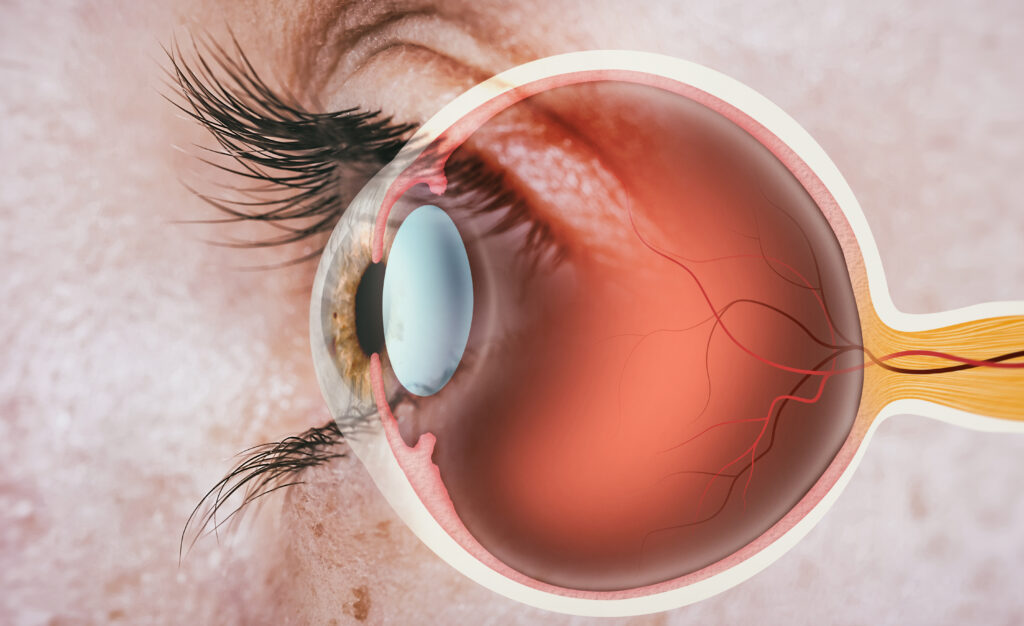
Can you name all the parts of your eye? Even if you can’t name every part, you have probably heard of the retina. The retina is the light-sensitive tissue that lines the back of the eye. It is very important to your vision. This means that any type of damage to or disease of your retina can have severe consequences. Here at Berks Eye, we treat a number of eye conditions that affect your retina.
1. Macular Degeneration
The macula is the part of the retina necessary for clear central vision. Age-related macular degeneration is a leading cause of vision loss in the United States. There are two types of macular degeneration: wet and dry. Both are diagnosed with a comprehensive eye exam.
2. Diabetic Retinopathy
People with diabetes are at risk for diabetic retinopathy, a condition that results from damage to the blood vessels of the retina. If left untreated, diabetic retinopathy can result in vision loss.
Age-related changes to the vitreous can cause flashes and floaters. The vitreous is the substance that fills the center of the eyes. Strands of the substance can cast shadows on the retina, which appear as floaters in your visual field. Since the vitreous is in contact with the retina, it can also pull on the tissue. If it pulls hard enough and tears the retina, then you may see light flashes in your vision.
3. Flashes and Floaters
Age-related changes to the vitreous can cause flashes and floaters. The vitreous is the substance that fills the center of the eyes. Strands of the substance can cast shadows on the retina, which appear as floaters in your visual field. Since the vitreous is in contact with the retina, it can also pull on the tissue. If it pulls hard enough and tears the retina, then you may see light flashes in your vision.
4. Lattice Degeneration
Lattice degeneration is a condition that involves thinning of the peripheral retina. This condition can lead to other retina issues that can impact your vision.
5. Retinal Tear/Detachment
As discussed above, age-related changes to the vitreous can cause retinal tears which can impact your vision. Some retinal tears can develop into retinal detachment, wherein the retina separates from its normal position at the back of the eye. This can lead to serious vision complications and even blindness.
6. Posterior Vitreous Detachment
When the vitreous begins to pull away from the retina, the separation is called posterior vitreous detachment. This can cause retinal issues, including retinal tear or retinal detachment.
7. Retinal Vein Occlusion
Retinal vein occlusion occurs when there is a blockage of the veins in the retina. This can cause vision problems and other issues.
8. Macular Pucker
The macula lays flat against the back of the eye. However, age-related changes can cause retina tears and, as a result, scar tissue develops. This scar tissue may cause the macula to wrinkle or pucker, resulting in blurred or distorted central vision.
9. Macular Hole
A macular hole can also be caused by age-related changes to the vitreous when the vitreous pulls and results in a small tear or hole in the macula. It can cause distorted central vision.
Speak to Our Retina Specialist
Guri Bronner, M.D., is Berks Eye’s retina specialist. He is a board-certified ophthalmologist with subspecialty training in retina diseases and treatments. To schedule an appointment with Dr. Bronner or one of our other highly skilled eye doctors, please call (610) 372-0712.
 1802 Paper Mill Road, Wyomissing, PA 19610
1802 Paper Mill Road, Wyomissing, PA 19610

